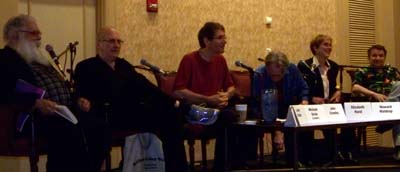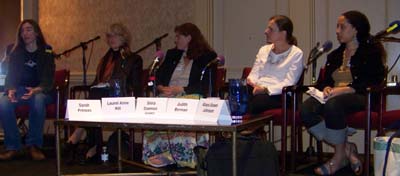Readercon 20: Sunday, July 12th.
Sunday is the last day of Readercon. I’m beginning to think I just might be a bit old for the very late night/early morning thing. Anyway, we were up and packed up our room to check out before opening our table in the Dealer’s Room (we set up at 9:30 and the room opens at 10).

"Classics for Pleasure" Panel
10:00 Classics for Pleasure. Panelist: Samuel R. Delany, John Clute, Michael Dirda (Leader), John Crowley, Elizabeth Hand, Howard Waldrop. Talk/Discussion (60 min.). In his latest book, Pulitzer Prize-winning critic Dirda continues his lifelong campaign to break down the artificial boundaries between mainstream and genre classics. In this collection of nearly 90 essays he writes about such fantasy authors as Lucian, E.T.A. Hoffmann, James Hogg, Sheridan Le Fanu, Jules Verne, E. Nesbit, M.R. James, H.P. Lovecraft, Philip K. Dick, and Edward Gorey. In one section, “Loves Mysteries,” he discusses Sappho, the Arthurian Romances, The Princess of Cleves, Kierkegaard’s Diary of a Seducer, George Meredith’s sonnet sequence “Modern Love” (which is actually about divorce), the poetry of C.P. Cavafy and Anna Akhmatova, the regency romances of Georgette Heyer, and Daphne Du Maurier’s Rebecca. Throughout Dirda writes about adventure novels, mysteries, ghost stories and science fiction with the same respect and affection he brings to discussing Samuel Johnson, Henry James, and Willa Cather. If any of these authors are new to you or if you want to suggest some other favorite books, come talk with Dirda and his discussants about the pleasure of reading the classics.
Dirda talked about his childhood and how he’d bought a bag with three paperbacks in it and one of the books was The Lifetime Reading Plan by Clifton Fadiman. He loved books already and was fascinated by this book. The essays were not so much critical reviews of the works but invitations to share in the joy and pleasure of reading these books. That in his own books, he wants to share that same passion and enjoyment and joy in reading.
He said he believed that people who read only one type of book are provincial in the same way that people who never travel are provincial — you are missing the joy and experience of finding new areas to explore.
Other books that were recommended as good to get ideas were (of course) Michael Dirda’s books and Ex Libris by Anne Fadiman and Clifton Fadiman’s Reading I Liked.
Next the panelists were asked to talk about how they chose to become science fiction or fantasy writers or critics of the genre. All of the stories were very interesting. Delaney spoke about how he’d read voraciously but the first science fiction book that he read, Farmer in the Sky (Robert Heinlein), elicited an emotional reaction that none of the other books he read did. Partly because he identified with the character who had a pesky sister and the events of the book. But as he read more and more in the genre he found that these books resonated with him. The others had similar stories to tell. Waldrop said that he’s been reading SF and fantasy since he was six and so his ideas just come to him in that format.
These stories and the resultant conversation about the barriers between the genres and mainstream fiction and what the relationship should be between genre fiction and mainstream filled the hour.
I took and hour to help out in the Dealers’ Room — mostly get Hyperion some water and chat.

"Strong Stories with Strong Parents" panel
12:00 Strong Stories with Strong Parents. Panelists: Sonya Taaffe, Laurel Anne Hill, Shira Daemon (Leader), Judith Berman, Alaya Dawn Johnson. Absent or clueless parents are endemic in YA fiction: after all, it’s much easier to put your young protagonists in dramatic peril when Mom and/or Dad aren’t there or aren’t up to protecting or rescuing them (or noticing they’ve gone AWOL). Rather than bitch about the many offenders, we’ll talk about YA books that feature strong, capable parents who do the right things but whose kids still get in fantastic hot water. What are some of the ways of creating peril and predicaments for teen characters even as their parents watch over them well?
This was another excellent panel. After bemoaning the trend to kill off the parents or somehow get the children on their own for an adventure, the talk turned to books that do it right. Rather than blather on here’s the list:
Flora Segunda: Being the Magickal Mishaps of a Girl of Spirit, Her Glass-Gazing Sidekick, Two Ominous Butlers (One Blue), a House with Eleven Thousand Rooms, and a Red Dog by Ysabeau S. Wilce
Flora’s Dare: How a Girl of Spirit Gambles All to Expand Her Vocabulary, Confront a Bouncing Boy Terror, and Try to Save Califa from a Shaky Doom (Despite Being Confined to Her Room) by Ysabeau S. Wilce
Chitty Chitty Bang Bang by Ian Fleming (The book NOT the movie, in the book the children have both parents and the parents go on most of the adventures with the children.)
The Wolves of Willoughby Chase (The Wolves Chronicles) by Joan Aiken and Pat Marriott
Magic Or Madness Trilogy by Justine LarbalestierLittle Brother by Cory Doctorow
Children of the Lamp series by by P.B. Kerr
Percy Jackson & the Olympians by Rick Riordan
So You Want to be a Wizard series by Diane Duane
Wonderful Flight to the Mushroom Planet series by Eleanor Cameron
Song for the Basilisk by Patricia A. McKillip (not strictly YA)
A Wrinkle in Time, A Wind in the Door, A Swiftly Tilting Planet, Many Waters, An Acceptable Time by Madeleine L’Engle
The Secret Country Trilogy by Pamela Dean
Cycler by Lauren McLaughlin
[Hyperion: Two nice young ladies at a Dunkin Donuts along the way where kind enough to give us the last couple of donuts they were going to to otherwise throw away. I’m sure it’s against company policy, so I won’t say where this took place, but they were just too nice not to get a word of thanks.]




